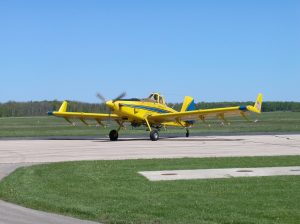
Spray aircraft used in gypsy moth control.
Residents in the Madison and Baraboo areas can expect a morning or two of loud, low-flying planes this May. The DNR Gypsy Moth Suppression Program will be spraying to control high populations of gypsy moth, an invasive and destructive pest whose caterpillars feed on the leaves of many tree and shrub species. Aerial spraying will occur in the following locations:
- Cities of Madison and Monona: Three sites in and around Orton Park, Quaker Park, and Acewood/Elvehjem Parks
- Devils Lake State Park: Day-use area at the south end of the lake, and the day-use area and several campgrounds at the north end of the lake.
Maps of the treatment areas can also be seen at the Wisconsin Cooperative Gypsy Moth Program website. Spraying is currently predicted to occur in mid-May, but actual dates will depend on weather conditions and caterpillar development.
Spray information
- The planes fly very low and loud over the treatment sites and surrounding areas. Spraying will only occur within the treatment boundaries.
- Planes may begin spraying as early as 5 a.m. and may continue into the late morning or afternoon if weather conditions are favorable. Spraying could occur any day of the week.
- Local governments, schools and medical facilities are notified of the spraying.
- Sites will be sprayed with ‘Foray,’ a bacterial insecticide which contains Bacillus thuringiensis var. kurstaki (Btk). Btk is a naturally-occurring soil bacterium that only kills caterpillars when it is eaten. Btk is not toxic to people, bees, pets or wild animals. Health effects are unlikely, although some people with severe allergies may wish to stay indoors during spray application (if in the treatment areas) or avoid areas to be sprayed on the day that spraying occurs.
- The ‘Foray’ being applied is listed with the Organic Materials Review Institute as acceptable for use in certified organic food production.
- Individuals can sign up for frequent email notifications of when the spraying will occur, by visiting the Wisconsin Cooperative Gypsy Moth Program website.
The Wisconsin Department of Agriculture, Trade and Consumer Protection will also be conducting gypsy moth treatments in 18 western counties as part of the “Slow-The-Spread” program. This program treats isolated, low populations of gypsy moth to slow the westward spread of the pest. Slow-The-Spread treatments use either the same ‘Foray’ insecticide as the DNR Suppression Program, or a pheromone mating disruptor that interferes with the ability of male moths to find female moths, preventing reproduction.
For more information about gypsy moth and aerial spraying, visit the Wisconsin Cooperative Gypsy Moth Program website. Or, call the toll-free Gypsy Moth Line at 1-800-642-MOTH (1-800-642-6684) to talk to staff or hear a recording of up-to-date spray plans. You can also read more in this year’s gypsy moth spray season kickoff press release.
Written by: Bill McNee, forest health specialist, Plymouth (Bill.Mcnee@Wisconsin.gov), 920-360-0942.
